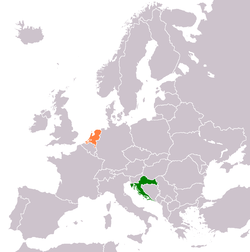Croatia–Netherlands relations
 | |
Croatia |
Netherlands |
|---|---|
Croatian-Dutch are foreign relations between Croatia and Netherlands. Both countries established diplomatic relations on April 23, 1992. Croatia has an embassy in The Hague. The Netherlands have an embassy in Zagreb and 3 honorary consulates (in Dubrovnik, Opatija and Split). Both countries are full members of the European Union and NATO. Both The Netherlands joined the EU in Founder, and Croatia joined the EU in 2013.
Country comparison
| Coat of arms | 
|

|
| Population | 4,076,246 | 17,237,700[1] |
| Area | 56,594 km2 (260,558 sq mi) | 41,543 km² (16,033 sq mi) |
| Population Density | 73/km2 (21,851/sq mi) | 415.1/km² (1,075.1/sq mi) |
| Capital | Zagreb | Amsterdam (capital), The Hague (seat of government) |
| Largest City | Zagreb – 790,017 (1,228,941 Metro) | Amsterdam – 851,573 (2,431,000 Metro) |
| Global Cities | Zagreb, Split, Rijeka, Osijek, Dubrovnik, Koprivnica, Varaždin, Pula, Velika Gorica. | Amsterdam, Eindhoven, Rotterdam, The Hague, Utrecht, Maastricht, Assen, Groningen, Zwolle, Enschede, Arnhem, Noordwijk, Alkmaar, Zandvoort. |
| Government | Unitary parliamentary constitutional republic | Unitary parliamentary constitutional monarchy |
| Official language | Croatian | Dutch |
| Current Leader | President Zoran Milanović Prime Minister Andrej Plenković |
Monarch Willem-Alexander Prime Minister Mark Rutte |
| Main religions | 86.28% Roman Catholicism, 4.57% Irreligious, 4.44% Eastern Orthodoxy, 1.47% Islam, 2.90% others |
50.1% unaffiliated, 23.7% Roman Catholic, 6.5% Dutch Reformed Church, 5.7% Protestant Church in the Netherlands, 3.3% Reformed Churches in the Netherlands, 4.9% Islam, 4.6% other, 0.6% Hinduism, 0.4% Buddhism, 0.1% Judaism[2][3] |
| Ethnic groups | 90.42% Croats, 4.36% Serbs, 5.22% Others |
79.3% Dutch, 6.3% other European, 4.9% Indo, 2.4% Turkish, 2.2% Moroccan-Dutch, 2.1% Surinamese, 0.9% Caribbean, 0.3% Chinese, 0.3% Iraqi, 3.9% other |
| GDP (PPP) | $117.928 billion ($29,207 per capita) | $945.327 billion[4] |
Diplomacy
See also
- Foreign relations of Croatia
- Foreign relations of the Netherlands
- 2013 enlargement of the European Union
References
- ^ "Population counter". Centraal Bureau voor de Statistiek. 2017. Retrieved 17 February 2018.
- ^ Schmeets, Hans (2016). De religieuze kaart van Nederland, 2010–2015 (PDF). Centraal Bureau voor der Statistiek. p. 5.
- ^ CBS. "Helft Nederlanders is kerkelijk of religieus". www.cbs.nl (in Dutch). Retrieved 2017-10-17.
- ^ "Netherlands". International Monetary Fund. April 2018.,


